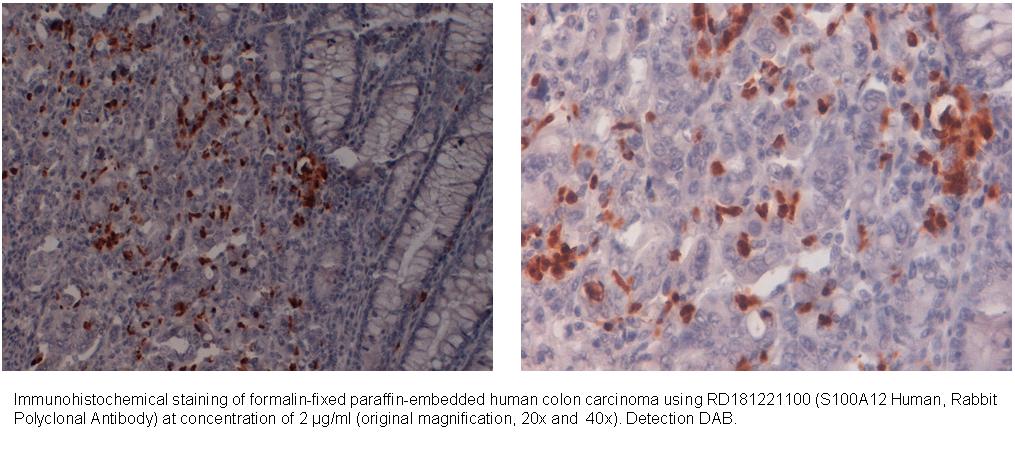Type
Polyclonal Antibody
Applications
Western blotting, ELISA, Immunohistochemistry
Antibodies Applications
Source of Antigen
E. coli
Hosts
Rabbit
Preparation
The antibody was raised in rabbits by immunization with the recombinant Human S100A12.
Amino Acid Sequence
Total 101 AA. MW: 11.63 kDa (calculated). UniProtKB acc.no. P80511. N-Terminal His-tag, 10 extra AA.
MKHHHHHHASTKLEEHLEGIVNIFHQYSVRKGHFDTLSKGELKQLLTKELANTIKNIKDKAVIDEIFQGLDANQDEQVDFQEFISLVAIALKAAHYHTHKE
Species Reactivity
Human. Not yet tested in other species.
Purification Method
Immunoaffinity chromatography on a column with immobilized recombinant Human S100A12.
Antibody Content
0.1 mg (determined by BCA method, BSA was used as a standard)
Formulation
The antibody is lyophilized in 0.05 M phosphate buffer, 0.1 M NaCl, pH 7.2.
Reconstitution
Add 0.2 ml of deionized water and let the lyophilized pellet dissolve completely. Slight turbidity may occur after reconstitution, which does not affect activity of the antibody. In this case clarify the solution by centrifugation.
Shipping
At ambient temperature. Upon receipt, store the product at the temperature recommended below.
Storage/Expiration
The lyophilized antibody remains stable and fully active until the expiry date when stored at -20°C. Aliquot the product after reconstitution to avoid repeated freezing/thawing cycles and store frozen at -80°C.
Quality Control Test
Indirect ELISA – to determine titer of the antibody
SDS PAGE – to determine purity of the antibody
BCA - to determine quantity of the antibody
Note
This product is for research use only.
Research topic
Immune Response, Infection and Inflammation, Inflammatory bowel disease, Lipoprotein metabolism, Neural tissue markers, Oncology, Pulmonary diseases, Renal disease
Summary
S100A12 (EN-RAGE, calgranulin) is a member of the S100 protein family, which, in humans, consists of twenty five EF-hand (alpha helix-loop-alpha helix), calcium-binding proteins, of which the vast majority is in homodimer, heterodimer or more complex forms. Mature S100A12 consists of 91 amino acids (Mw 10.4 kDa); it is predominantly expressed and secreted by neutrophil granulocytes and to a lower extent, it was found in monocytes. Hofmann et al. (1999) reported that RAGE is a central cell surface receptor for S100A12, which they referred to as EN-RAGE (Extracellular Newly identified RAGE-binding protein), and related members of the S100/calgranulin superfamily. Interaction of EN-RAGE (S100A12) with cellular RAGE on endothelium, mononuclear phagocytes, and lymphocytes triggered cellular activation, with generation of key proinflammatory mediators. In murine models, blockade of EN-RAGE/RAGE quenched delayed-type hypersensitivity and inflammatory colitis by arresting activation of central signaling pathways and expression of inflammatory gene mediators. With regard to its inflammatory properties, S100A12 was already described as a promising marker for many diseases in humans such as neurodegenerative diseases, atherosclerosis, cancerogenesis, osteoarthritis, familial mediterranean fever and idiopathic pulmonary fibrosis. Plasma S100A12 level is associated with cardiovascular disease in hemodialysis patients. S100A12 and its receptor RAGE are found at high concentrations in pulmonary tissue and bronchoalveolar lavage fluid in acute lung injury. S100A12 expression reflects neutrophil activation during lung inflammation. Faecal S100A12 is a novel non-invasive marker distinguishing inflammatory bowel disease (IBD) from irritable bowel syndrome (IBS). Furthermore, S100A12 reflects inflammatory activity of chronic IBD. As a marker of neutrophil activation, faecal S100A12 may significantly improve the arsenal of non-invasive biomarkers of intestinal inflammation.

